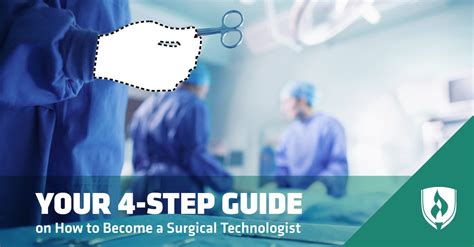Surgical technology is a vital component of the healthcare system, and as a surgical technologist, you play a crucial role in ensuring that surgical procedures are carried out efficiently and safely. If you're interested in pursuing a career as a surgical technologist in Georgia, here's a step-by-step guide to help you get started.
The demand for skilled surgical technologists is on the rise, with the Bureau of Labor Statistics (BLS) predicting a 3% growth in employment opportunities through 2029. As a surgical technologist in Georgia, you can expect a median salary of around $44,000 per year, depending on your level of experience and location.
To become a surgical technologist in Georgia, you'll need to complete a series of educational and training requirements. Here's a breakdown of the 7 steps to help you achieve your goal:
Step 1: Earn a High School Diploma or Equivalent
Before you can start your journey to becoming a surgical technologist, you'll need to earn a high school diploma or equivalent. This will provide you with the foundational knowledge and skills required to pursue a career in surgical technology.
While in high school, focus on taking courses in sciences, such as biology, chemistry, and anatomy, as these will be essential for your future studies.

Step 2: Complete a Surgical Technology Program
Once you've earned your high school diploma, the next step is to complete a surgical technology program approved by the Commission on Accreditation of Allied Health Education Programs (CAAHEP) or the Accrediting Bureau of Health Education Schools (ABHES).
In Georgia, you can find CAAHEP-accredited programs at institutions such as:
- Albany Technical College
- Atlanta Technical College
- Augusta Technical College
- Chattahoochee Technical College
- Coastal Pines Technical College
These programs typically last around 12-18 months and lead to a certificate, diploma, or associate's degree in surgical technology.

Step 3: Gain Practical Experience
As part of your surgical technology program, you'll have the opportunity to gain practical experience through clinical rotations. This hands-on experience will help you develop the skills and confidence you need to succeed as a surgical technologist.
During your clinical rotations, you'll work alongside experienced surgical technologists and medical professionals to learn about:
- Surgical procedures and techniques
- Patient care and safety
- Infection control and sterilization
- Medical terminology and anatomy

Step 4: Pass the Certified Surgical Technologist (CST) Exam
After completing your surgical technology program and gaining practical experience, the next step is to pass the Certified Surgical Technologist (CST) exam.
The CST exam is administered by the National Board of Surgical Technology and Surgical Assisting (NBSTSA) and is the gold standard for certification in the field. To be eligible for the exam, you'll need to meet the NBSTSA's eligibility requirements and submit an application.
The CST exam consists of 175 multiple-choice questions and covers topics such as:
- Surgical procedures and techniques
- Patient care and safety
- Infection control and sterilization
- Medical terminology and anatomy

Step 5: Obtain Certification and Licensure
After passing the CST exam, you'll be certified as a surgical technologist. While certification is not mandatory in Georgia, it's highly recommended as it demonstrates your expertise and commitment to the profession.
In addition to certification, some employers may require licensure. While Georgia does not require licensure for surgical technologists, you may need to obtain a license to work in certain facilities or specialties.

Step 6: Maintain Certification and Continuing Education
As a certified surgical technologist, you'll need to maintain your certification through continuing education and professional development.
The NBSTSA requires certified surgical technologists to complete 60 hours of continuing education every 4 years to maintain their certification. This ensures that you stay up-to-date with the latest technologies, techniques, and best practices in the field.

Step 7: Pursue Specialized Certifications and Advancement Opportunities
Finally, as a certified surgical technologist, you may want to consider pursuing specialized certifications or advancement opportunities to further your career.
Specialized certifications, such as the Certified Registered Central Service Technician (CRCST) or the Certified Sterile Processing and Distribution Technician (CSPDT), can demonstrate your expertise in specific areas and enhance your job prospects.
Advancement opportunities, such as moving into leadership or management roles, can also provide a higher salary and greater job satisfaction.

In conclusion, becoming a surgical technologist in Georgia requires a combination of education, training, and certification. By following these 7 steps, you can set yourself up for success in this rewarding and challenging career.
If you're interested in learning more about the surgical technology program or would like to explore other healthcare careers, please leave a comment below or share this article with your friends and family.






What is the average salary for a surgical technologist in Georgia?
+The average salary for a surgical technologist in Georgia is around $44,000 per year, depending on location and level of experience.
Do I need to be certified to work as a surgical technologist in Georgia?
+Certification is not mandatory in Georgia, but it is highly recommended as it demonstrates expertise and commitment to the profession.
How long does it take to complete a surgical technology program in Georgia?
+Surgical technology programs in Georgia typically last around 12-18 months and lead to a certificate, diploma, or associate's degree in surgical technology.
